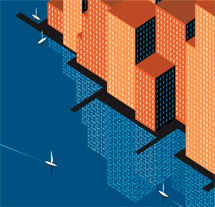| Mirror Worlds | 2003-10-15 16:00 3 comments |
 by Flemming Funch by Flemming FunchSteven Johnson had an interesting article in Discover in May: "Imagine if SimCity wasn't just a game". In part he's talking about David Gelernter's vision of mirror worlds. Computer simulations of the real world. "Mirror worlds were not supposed to be an escape from reality; they were supposed to reflect reality. A modern-day city generates plumes of data the way 19th-century industrial towns generated smoke. There are block-by-block crime statistics, test scores for every student in every school, traffic reports updated by the second, demographic profiles by zip code, and so on. All of those numbers exist somewhere in cyberspace, but finding them is next to impossible. Gelernter envisioned a centralized repository for all this data, a virtual reconstruction of a space that would showcase everything going on in reality. Gelernter's simulated worlds were going to be mirrors. By comparison, the simulations we have now are fantasy islands.That's what I want too. Most computerized information is too damn scattered about and isn't visualized as what it really is. More and more impressive simulated fantasy worlds are created through computers, mostly in the form of games. But what about all the data I really need access to in life, and which actually would make a substantial difference in the quality of my choices. That's what I'd most want good simulations of. Not only for affairs in my own life, but I want to get a more clear picture of what is going on in the world. What is really happening in terms of economy and environment and culture? News tends to just give a dumbed-down soundbite summary of selected parts. I want to see for myself. Here in Gelernter's own words: "My life, like your life, is a series of events in time, with a past, present, and future," Gelernter says, sitting in a conference room in the New Haven offices of Mirror Worlds Inc., the software company he cofounded. "And that's the way my software ought to look. The mirror worlds approach to organizing information is based on reality, as opposed to an engineer's or a computer scientist's fantasy. I don't want my personal life to be stored in an arbitrary UNIX file tree; I want it to be life-shaped—the shape of the way I live it." He gestures out the window, to the stately spires and ivy-covered buildings of the Yale campus. "I want information on New Haven to be New Haven-shaped, not in 10,000 separate databases."Right on. Life size. Life shaped. The metaphor of a desktop with notes and files serves badly in giving a good picture of my world. My real-life desktop doesn't do that, so why should it if it is on my computer screen. No, it needs to have at least the scope of the full physical environment. And after that I'd like to go beyond that and have more dimensions than what we walk around in. But life-size data would be a good start. |